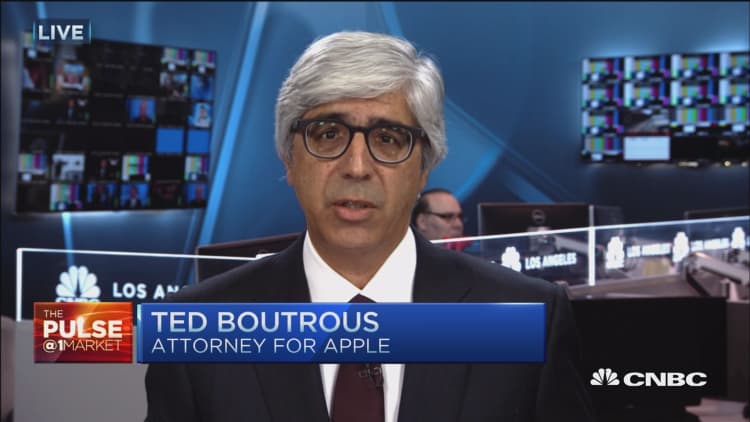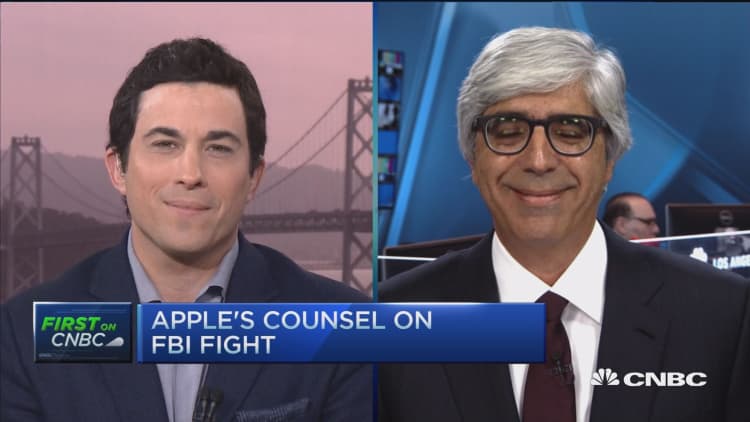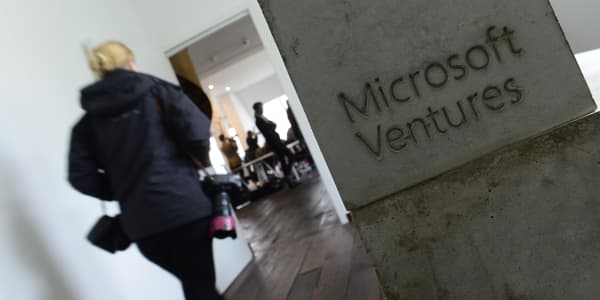Apple counsel Ted Boutrous told CNBC on Monday that Justice Department lawyers "got a little bit carried away" with their rhetoric in the latest court filing in the tech giant's legal battle against the government over encryption.
"There is a disconnect between the rhetoric in the Justice brief and what we have heard from [FBI Director James] Comey and President Obama," Boutrous said. "The lawyers who filed the brief got a little bit carried away with their rhetoric," he told CNBC.
Boutrous said Apple will shortly respond to the government on why the Justice Department arguments are wrong and "would have terrible consequences" for national security and citizens. Ultimately, though, Apple does not believe the right forum for this battle is the courts.

"This is a policy issue ... the American people have to resolve," Boutrous said. "It's for Congress to resolve," he added.
Last week, Apple senior vice president and general counsel Bruce Sewell said in a call with reporters that the DOJ has become "so desperate" that it has "thrown all decorum to the wind." He added, "The tone of the brief reads like an indictment."
Boutrous said it would be a mistake to think the issue is just about Apple vs. the government. He said there is a cavalcade of tech companies and civil liberties groups and a family member of a victim of San Bernardino who filed court briefs supporting Apple's position.
"This case ... will set a precedent. ... It will be used around the country and world to unlock phones," Boutrous said. "It's a big issue that goes far beyond Apple and affects all tech companies and all citizens who use these devices, and that will be front and center when we argue in court," the Apple lawyer said.
It's a big issue that goes far beyond Apple and affects all tech companies and all citizens who use these devices, and that will be front and center when we argue in court.Ted BoutrousApple counsel

Boutrous noted that comments from President Obama and others in government in the past have not been nearly as extreme as the Justice legal brief. Boutrous said that people who interpret President Obama's comments as supporting a back door to encryption are ignoring many previous comments from advisors to the president, including the Secretary of Defense and a commission on technology that Obama appointed in 2013. "They are all strongly supportive of encryption and against back doors that would make us all vulnerable," Boutrous said.
"President Obama is someone who will listen to both sides of a dialogue and that's what we want here — is a dialogue and a conversation — as President Obama put it awhile back about these important issues," the Apple lawyer said.
Boutrous told CNBC in an earlier February interview that "the director of the FBI, James Comey, has said this is one of the hardest issues he's ever faced in government."

Last Friday, President Obama spoke at the SXSW conference in Austin and said that while recognizing the rights of citizens, there will be some constraints imposed by the government in order to make sure "we are safe and secure and living in a civilized society."
President Obama said the encryption issue won't be settled with an "absolutist view," but he also said we are living in a world that is equivalent to all citizens "walking around with the equivalent of a Swiss bank account in our pockets."
Apple counsel Boutrous told CNBC: "The government is often confronted with competing interests. Our Constitution creates limits." He added, "Here we are, talking about privacy and compelling speech ... ordering Apple to go and write software and create a new operating system that the company thinks is dangerous."
Boutrous also said the government has already been given access to information in the San Bernardino case and Apple cooperated immediately with the investigation. "It's not like there's a vacuum of information. But we have a system that protects the individual rights of citizens, privacy and the like. We also respect the needs of law enforcement. And the issue is how do we reconcile those competing interests. It's not an issue that the court can resolve. It's for the Congress," he said.





